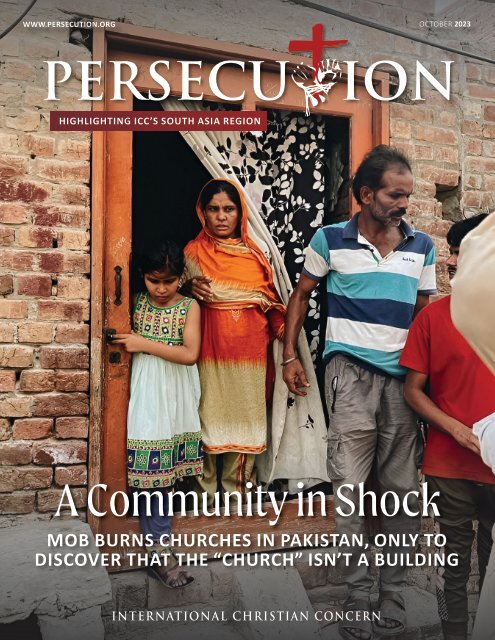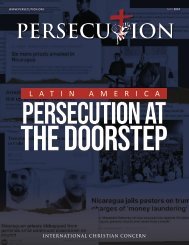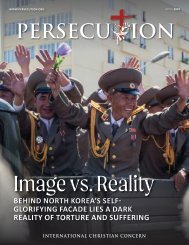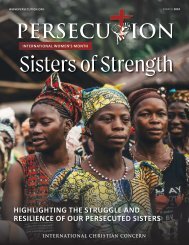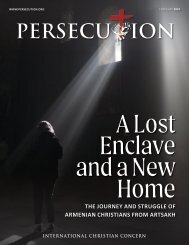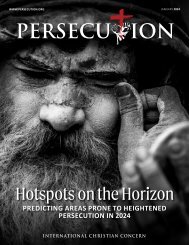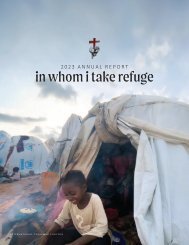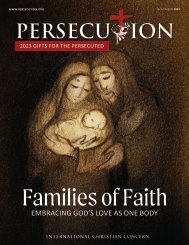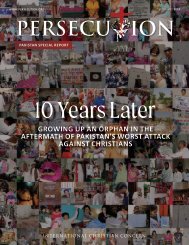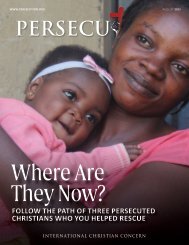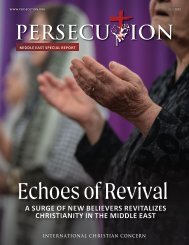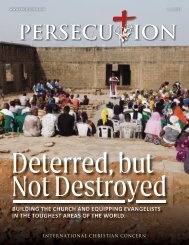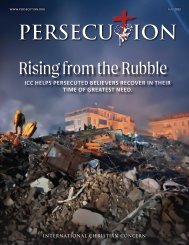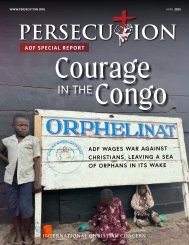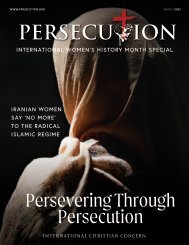October 2023 Persecution Magazine
You also want an ePaper? Increase the reach of your titles
YUMPU automatically turns print PDFs into web optimized ePapers that Google loves.
WWW.PERSECUTION.ORG<br />
OCTOBER <strong>2023</strong><br />
PERSECU ION<br />
HIGHLIGHTING ICC’S SOUTH ASIA REGION<br />
PERSECU ION<br />
PERSECU ION<br />
PERSECU ION.ORG<br />
INTERNATIONAL CHRISTIAN CONCERN<br />
A Community in Shock<br />
PERSECU ION.ORG<br />
MOB BURNS CHURCHES IN PAKISTAN, ONLY TO<br />
INTERNATIONAL CHRISTIAN CONCERN<br />
DISCOVER THAT THE “CHURCH” ISN’T A BUILDING<br />
PERSECU ION.ORG<br />
INTERNATIONAL CHRISTIAN CONCERN
Contents<br />
OCTOBER <strong>2023</strong><br />
ON THE COVER<br />
In Pakistan, 5,000 radical Muslims recently went<br />
on a rampage attacking Jaranwala, a Christian<br />
suburb of Faisalabad. They set at least 26<br />
churches on fire and damaged or destroyed at<br />
least 196 homes.<br />
Photo: International Christian Concern<br />
FEATURES<br />
10<br />
PERIL IN<br />
PAKISTAN<br />
18<br />
THE STRUGGLE THAT<br />
HAUNTS A GENERATION<br />
20 22<br />
A BRICK KILN WORKER’S<br />
TALE OF SURVIVAL<br />
THE AFGHAN EXODUS<br />
A Christian Community’s<br />
Struggle to Survive<br />
The Untold Stories of<br />
Pakistan’s Brick Kiln Workers<br />
The Agonizing Days for an<br />
Endless Pit of Debt<br />
When persecution fuels<br />
the rapid expansion of the<br />
church in Iran.<br />
RECURRING<br />
04<br />
06<br />
08<br />
24<br />
26<br />
ICC NEWSROOM Your Source for <strong>Persecution</strong> News<br />
WEST WATCH Issues Involving Christianity in the West<br />
YOUR HANDS AND FEET ICC Projects Made Possible by Our Supporters<br />
HOPE HOUSE Transforming the Tomorrows of India’s Youngest Generation<br />
CROWNS OF COURAGE Inspiration from Memorable Martyrs<br />
@persecuted @persecutionnews @internationalchristianconcern International Christian Concern<br />
OUR MISSION: Since 1996, ICC has served the global<br />
persecuted church through a three-pronged approach of<br />
advocacy, awareness, and assistance. ICC exists to bandage<br />
the wounds of persecuted Christians and to build the church<br />
in the toughest parts of the world.<br />
DONATIONS: International Christian Concern (ICC) is a nonprofit 501(c)(3) (all<br />
donations tax-deductible). ICC makes every effort to honor donor wishes in regards to<br />
their gifts. Occasionally, a situation will arise where a project is no longer viable. ICC<br />
will redirect those donated funds to one of our other funds that is most similar to the<br />
donor’s original wishes.<br />
© Copyright <strong>2023</strong> ICC, Washington, D.C., USA. All rights reserved.<br />
Permission to reproduce all or part of this publication is granted<br />
provided attribution is given to ICC as the source.<br />
STAFF<br />
Publisher Jeff King<br />
Managing Editor Alex Finch<br />
Editor and Designer Hannah Campbell<br />
2<br />
<strong>Persecution</strong> | OCTOBER <strong>2023</strong>
When All is Lost, We Show Up<br />
You are sitting in your home, relaxing and playing with your toddler<br />
after dinner. Your wife is reading in the living room when<br />
you begin to hear the roar of a massive and angry crowd moving<br />
toward your home.<br />
In the West you would be puzzled and wander outside to investigate. In<br />
Pakistan, you scream to your wife to grab the baby as you pick up your<br />
toddler and flee with nothing but the clothes on your back, hoping<br />
you have just enough time to escape an enraged mob that’s come to<br />
destroy your neighborhood.<br />
This isn’t theoretical, but rather reality for so many Christians in Pakistan.<br />
I’ve seen it more times than I care to recount, including just a few<br />
weeks ago in the neighborhood of Jaranwala, outside of Faisalabad.<br />
You can read the details on page 10 as hundreds of families were left<br />
homeless and living in the fields. Our staff was on the ground the next<br />
day surveying the damage, recording the names and circumstances of<br />
the victims, and giving initial aid (food, cooking pots, soap, etc.).<br />
The real recovery will take many months, if not years, but we are determined<br />
to link arms and help them rebuild.<br />
We are the family of God, and this is what we do. The lost look on and<br />
wonder why people from across the world care about the victims and<br />
then their neighbors tell them, “My brothers and sisters from across<br />
the world have rescued us, for we are all one body.”<br />
If you would like to join us in this effort, please visit www.persecution.<br />
org/pakistan-in-peril.<br />
We will use your gifts ethically, efficiently, and effectively.<br />
God bless you!<br />
JEFF<br />
Jeff King, President<br />
International Christian Concern<br />
Author: The Last Words of the Martyrs and<br />
Islam Uncensored<br />
Aware of their discussion, Jesus asked, “You of little faith, why are you<br />
talking among yourselves about having no bread?”<br />
- MATTHEW 16:8<br />
PERSECUTION.ORG 3
ICC Newsroom<br />
YOUR SOURCE FOR PERSECUTION NEWS<br />
A Buddhist temple at Lumbini, Nepal, the birth place of Buddha/iStock<br />
Two Nepalese Churches Attacked in Growing Trend<br />
An attack on a church in Nepal’s Lumbini Province was just<br />
the latest in a string of recent violence against Christians<br />
in the country. The church is in the southern Nawalparasi<br />
district of Lumbini along the border with India’s Uttar Pradesh<br />
state and was one of two churches in the same town that were<br />
vandalized over one weekend last month.<br />
Photos and videos reviewed by International Christian Concern<br />
(ICC) showed broken windows and other signs of violence<br />
around the property, including damage to fencing and a broken<br />
motorbike. Another photo shared on social media showed<br />
two men, identified as pastors, being assaulted on the street.<br />
Gathered locals appear to have smeared the pastors’ faces with<br />
a sticky black substance in an act described by ICC contacts as a<br />
cultural sign of hatred and disrespect.<br />
ICC has learned that the attacks in Lumbini are the sixth and<br />
seventh such attacks against churches in Nepal in the last two<br />
weeks. “It’s spreading like wildfire,” a Nepalese civil society<br />
leader said about the recent spate of attacks. Perpetrators,<br />
seeing little to no response from the authorities in recent weeks,<br />
“are encouraged to act more,” he told ICC.<br />
News of another incident of men assaulting Christians, this time<br />
in Janakpur, emerged on Tuesday as word of Monday’s attack on<br />
the two pastors spread.<br />
In Kathmandu, the country’s capital city, two men were<br />
apparently arrested and taken to court for street preaching.<br />
Though the country’s constitution ostensibly protects religious<br />
freedom, it does so in vague enough terms to allow a law today<br />
that criminalizes proselytization.<br />
Chapter 19 of the Muluki Ain, or general code of Nepal, states<br />
that “no one shall propagate any religion in such manner as to<br />
undermine the religion of other nor shall cause other to convert<br />
his or her religion.”<br />
Religious minorities are regularly arrested and charged under<br />
this law, which goes beyond its neighbor India’s bans on forced<br />
conversions to criminalizing participation in the act of conversion<br />
in any form. In Nepal, proselytization carries with it the threat of<br />
up to six years in prison and subsequent deportation in the case<br />
of foreigners.<br />
The U.S. Department of State highlighted its concerns with<br />
Nepal’s anti-conversion and anti-proselytization laws in a report<br />
published earlier this year. “Multiple religious groups in the<br />
country,” the report stated, “[continue] to reiterate that the<br />
constitutional and criminal code provisions governing religious<br />
conversion and proselytism [are] vague and contradictory and<br />
[open] the door for prosecution for actions carried out in the<br />
normal course of practicing one’s religion.<br />
4<br />
<strong>Persecution</strong> | OCTOBER <strong>2023</strong>
VISIT OUR WEBSITE, PERSECUTION.ORG, FOR THE LATEST NEWS<br />
Islamic<br />
Extremist<br />
Groups Killed<br />
2,500 Christians<br />
in Six Months<br />
Five Sentenced to Life for Murder of<br />
American Christian in Baghdad<br />
Five individuals—four Iraqi militia<br />
members and one Iranian national—were<br />
recently sentenced to life imprisonment by<br />
an Iraqi court for the murder of American<br />
Christian Stephen Troell that took place in<br />
November 2022.<br />
The five individuals stated that their<br />
attempt was to kidnap Stephen and hold<br />
him for ransom, but instead ended up<br />
shooting him dead while Stephen was<br />
driving his car in Baghdad. Stephen was<br />
survived by his wife and three daughters.<br />
At the time of the assassination, it was<br />
unclear exactly if Stephen himself was<br />
a target. Some reports highlight that<br />
his murderers claimed that he was an<br />
American spy and thus a target for Iran<br />
and powerful Baghdad-based Iranianbacked<br />
militias due to inaccurate Iranian<br />
government media claims that he was<br />
employed with USAID. Other reports state<br />
that he was also targeted by the militias<br />
due to his activity of publicly sharing his<br />
faith online in a Muslim-majority city<br />
like Baghdad and thus had been under<br />
surveillance by militias for a period of time<br />
leading up to his assassination.<br />
Terrorists Kill Two, Burn Down Church and 10 Homes<br />
On August 22, suspected al-Shabaab terrorists carried out deadly attacks in Kenya,<br />
resulting in two fatalities and the destruction of ten homes and a church. In Salama<br />
village, the Redeemed Gospel church pastor issued a distress call to an ICC staffer at<br />
2:00 a.m., reporting a terrorist assault that had engulfed their church in flames while<br />
also setting fire to nearby residences. The al-Shabaab militants, originating from Somalia,<br />
specifically targeted the church and its vicinity.<br />
Fulani militants and other allied<br />
jihadist groups slaughtered 2,500<br />
Christians in Nigeria in the first<br />
six months of <strong>2023</strong>. The data<br />
came from a report published<br />
by the International Society for<br />
Civil Liberties and Rule of Law,<br />
a Nigerian investigative firm<br />
focusing on human rights issues.<br />
The data highlights concern<br />
about frequent incidents of<br />
persecution against Christians<br />
in Nigeria in the areas where<br />
Islamic extremist groups, such as<br />
the Fulani militants, operate. This<br />
comes after Fulani militants killed<br />
37 Christians in Nigeria in three<br />
weeks, according to a report from<br />
International Christian Concern<br />
(ICC).<br />
ICC reported on efforts to add<br />
Nigeria to the list of Countries<br />
of Particular Concern (CPC)<br />
published by the U.S. Department<br />
of State. The State Department<br />
did not place Nigeria on the CPC,<br />
despite the recommendation<br />
from the U.S. Commission on<br />
International Religious Freedom.<br />
Authorities noted the attacks’ coordinated nature, but swift security responses prevented<br />
further casualties. Security forces pursued the assailants into the Boni forest, a notorious<br />
hiding place for the terrorist group responsible for multiple recent fatalities.<br />
In a separate incident on the Lamu Garsen road, two motorists fell victim to an al-Shabaab<br />
ambush. Travelers were forced to recite the Islamic shahada to spare their lives, with two<br />
individuals declining and subsequently losing their lives to gunfire.<br />
PERSECUTION.ORG 5
West Watch<br />
ISSUES INVOLVING CHRISTIANITY IN THE WEST<br />
Photo: ADFInternational.org<br />
Right: ICC President Jeff King with Päivi Räsänen and her husband Niilo Räsänen.<br />
UPDATE: Päivi Räsänen’s Battle for Religious<br />
Freedom and Free Speech<br />
We wanted to share an update and express our gratitude<br />
for the nearly 1,000 of our supporters who quickly<br />
rallied together to sign ICC’s petition in support of Päivi<br />
Räsänen.<br />
Räsänen, a Finnish Member of Parliament, faces charges for<br />
tweeting a Bible verse. Her case has led to a fascinating discussion<br />
on the role of religious freedom and free speech in the public<br />
square.<br />
ICC President Jeff King has had the opportunity to interview her a<br />
few times and share the story from her own words. She explained<br />
that, if she were to be convicted, her case would be a tipping<br />
point of persecution for her nation. Receiving charges for simply<br />
tweeting a Bible verse, the message was clear: Keep your religious<br />
opinions out of the public square.<br />
Her case has been a rollercoaster over the past four years and<br />
raises a number of questions about the importance of free<br />
speech. Her trial began on August 29, and at the time of writing<br />
this article, we are monitoring the case closely.<br />
Her ongoing legal battle has become a symbol of the delicate<br />
balance between religious freedom and free speech in modern<br />
society.<br />
Facing charges for a simple act–tweeting a Bible verse–Räsänen’s<br />
case has captured international attention. For many, it raises<br />
concerns about the erosion of fundamental freedoms in a world<br />
that increasingly scrutinizes and, in some cases, penalizes religious<br />
expression.<br />
Päivi Räsänen’s journey is not just her own; it serves as a reminder<br />
that the struggle for religious freedom and free speech is an<br />
ongoing battle that demands our attention and support.<br />
We are grateful for the outpouring of support from nearly 1,000<br />
individuals who have stood with us in solidarity. We will continue<br />
to monitor the case closely and advocate for the principles that<br />
underpin a free and open society. As always, we will continue to<br />
keep you updated on this ongoing situation.<br />
Visit International Christian Concern’s YouTube channel to watch<br />
the full interview with King and Räsänen.<br />
6<br />
<strong>Persecution</strong> | OCTOBER <strong>2023</strong>
The Tennes Family’s Stand for Religious Freedom<br />
A federal appeals court ruled in favor of a Christian<br />
family in Michigan that was allegedly discriminated<br />
against by a local government policy.<br />
The Tennes family farm, known as Country Mill<br />
Farms, is well known for its apples, cider, and<br />
generous donations to local food banks. Their goods<br />
have become a staple in the market in East Lansing,<br />
so when a new government policy designed to<br />
exclude Country Mill Farms was created, attention<br />
was drawn to the absence of the beloved member of<br />
the community.<br />
The policy was created in response to a social media<br />
post Steve Tennes made on his farm’s account which<br />
affirmed the Catholic view of marriage.<br />
A federal court ruled in August in favor of the Tennes<br />
family, saying they “forced to choose between<br />
following their religious beliefs and a government<br />
benefit for which they were otherwise qualified.” This<br />
decision has allowed the Tennes family to continue<br />
pursuing their mission statement: “glorifying God<br />
by facilitating family fun on the farm and feeding<br />
families.”<br />
Photo of Steve Tennes courtesy of the ADF<br />
Denmark’s Move to Safeguard<br />
Sacred Texts<br />
Government leaders in Denmark recently said they will propose a law that<br />
will make it illegal to desecrate any holy book in Denmark.<br />
This proposal comes after global outrage sparked by several burnings of the<br />
Quran and instances of retaliation in both Denmark and Sweden. Historically,<br />
Denmark has been viewed as a country the facilitates the denigration of<br />
cultures, religions, and traditions.<br />
The new law Justice Minister Peter Hummelgaard explained that “the bill will<br />
make it punishable, for example, to burn the Quran or the Bible in public. It<br />
will only aim at action in a public place or with the intention of spreading in<br />
a wider circle.”<br />
Hummelgaard further explained that these actions will become punishable<br />
by fines or up to two years in prison. While freedom of expression is regarded<br />
with utmost importance in Danish society, government officials including<br />
Hummelgaard believe this law to develop guidelines, but not restrictions,<br />
for the standards their culture has upheld.<br />
PERSECUTION.ORG 7
Your Hands and Feet<br />
ICC PROJECTS MADE POSSIBLE BY OUR SUPPORTERS<br />
ICC Restores Mobility and Dreams<br />
for 4-Year-Old Justine<br />
AFRICA<br />
RESTORE: LIVES & COMMUNITIES<br />
Displaced by the ruthless conflict ignited by the Allied<br />
Democratic Forces in Eastern Congo, a Christian family<br />
found solace in a refugee town. The harrowing tale of<br />
their flight from their hometown, marred by attacks that<br />
decimated their village, was etched in their memories.<br />
To make matters worse, their daughter, Justine, was struck<br />
by a fever at four years old that stole her speech and<br />
mobility.<br />
After hearing of the family’s tribulations, ICC extended a<br />
helping hand and provided Justine with a wheelchair – the<br />
key to unlocking Justine’s world, offering her the gift of<br />
movement and autonomy.<br />
The family’s gratitude overflowed; their hearts touched<br />
not only by tangible support but the hope of a brighter<br />
future. Her mother told ICC, “I am very happy and I thank<br />
ICC for all they have done for my child Justine...God bless<br />
ICC. Don’t forget to pray for us in this country, because<br />
many people are suffering. Pray for us so peace can be<br />
restored. My family and I, we are refugees here. God bless<br />
you so much.”<br />
After implementing the project, ICC staff received<br />
miraculous news from the family. “Justine is improving<br />
slowly by slowly. There is hope in the coming days, to walk<br />
herself.”<br />
8<br />
<strong>Persecution</strong> | OCTOBER <strong>2023</strong>
SOUTH ASIA<br />
ICC Steps in to Aid<br />
Christian Farmers<br />
Affected by Riots<br />
RESCUE: WIVES & KIDS<br />
MIDDLE EAST<br />
Hope From Honeybees<br />
MESSENGERS: UNDERGROUND WORKERS<br />
Yousif, born into a troubled, impoverished, practicing Muslim family, embraced<br />
Islam early. Despite religious conflicts, he encountered Jesus often, causing<br />
confusion in his world. A decade later, plagued by a mysterious ailment, Yousif<br />
tried numerous Muslim healers without success. Despondent, he met a Christian<br />
friend who revealed Jesus as a Savior, not just a prophet.<br />
Praying to Jesus, his despair lifted, healing him. He believed Jesus saved him,<br />
leading him to convert and share the gospel, preaching forgiveness, love, and<br />
salvation. He transformed into a sociable preacher, embracing Jesus’ teachings.<br />
He went to a theology school for five years and returned to start a family and<br />
preach the gospel. Currently, Yousif shepherds dozens of groups on a volunteer<br />
basis and he pastors a house church network. But he has no means to make an<br />
income. He was recently fired from his job after his Muslim boss found out he was<br />
a Christian. His parents rejected him as they believe Islam is the superior religion.<br />
Yousif is an experienced gardener and grows vegetables. Earlier this year, Yousif<br />
gained training on beekeeping. ICC provided Yousif with a beehive to begin his<br />
apiculture endeavor to care for his family and continue his ministry work.<br />
Between December 18, 2022, and<br />
January 2, <strong>2023</strong>, a series of anti-<br />
Christian riots caused significant harm.<br />
Among the victims were 26 Christian<br />
families. This farming community<br />
faced the loss of their seeds and grains<br />
as their homes were looted during the<br />
riots – an especially devastating loss<br />
as these Christian farmers rely solely<br />
on their crops for sustenance. With<br />
their homes destroyed and belongings<br />
stolen, their families now confront an<br />
insurmountable struggle for survival.<br />
The violent events, instigated by<br />
radical Hindu nationalists, displaced<br />
numerous Christians and left many<br />
injured. The impact was widespread,<br />
affecting over 2,000 individuals. The<br />
relentless campaign by these radicals<br />
has instilled fear within the Christian<br />
community in India.<br />
To alleviate the dire situation, ICC<br />
assisted severely affected Christians<br />
by providing seeds and fertilizers to<br />
enable farming. This support aims to<br />
ensure sustenance for these families<br />
throughout the year, beginning with<br />
aiding 26 families in the initial phase.<br />
PERSECUTION.ORG 9
Peril in Pakistan<br />
A CHRISTIAN COMMUNITY’S STRUGGLE TO SURVIVE<br />
10<br />
<strong>Persecution</strong> | OCTOBER <strong>2023</strong>
Much of the world was shocked by the nightmare<br />
that descended on a Christian community in<br />
Pakistan this August. The dust has long settled,<br />
and the world has all but moved on. Yet hundreds of<br />
Christian families and pastors are still picking up the<br />
pieces, trying to regain a foothold in the world that<br />
they lost. And we are there to help them.<br />
The tranquility of the quiet, Christian suburb of<br />
Faisalabad, Pakistan was shattered when 5,000 radical<br />
Muslims descended upon Jaranwala in a rampage.<br />
They set 26 churches ablaze, along with 196 homes,<br />
and many businesses. The scale of destruction is<br />
difficult to fathom, and it was a stark reminder of the<br />
precarious situation faced by Christians and other<br />
religious minorities in Pakistan.<br />
The uproar began when a Muslim man, driven by<br />
malice, made a false blasphemy charge against<br />
a Christian teen. It was a petty dispute over a<br />
business transaction that spiraled into a nightmare.<br />
The allegation was the spark, but the dry tinder of<br />
communal tension had been growing far too long.<br />
Word of the blasphemy charge quickly spread beyond<br />
the boundaries of Jaranwala.<br />
Angry mobs from afar descended upon the community<br />
with a fervor that defied reason. Witnesses recounted<br />
the chilling sight of men on motorcycles, laden with<br />
flammable materials, setting homes, churches, and<br />
businesses ablaze. The streets that once echoed with<br />
hymns and prayers now bore witness to an inferno<br />
fueled by intolerance.<br />
The attackers’ rage went beyond the false blasphemy<br />
charge; it was a collective belief by some that Christians<br />
were undermining Pakistan’s identity as a Muslim<br />
nation. Many among the mob were not even familiar<br />
with Jaranwala, but they came to destroy it. Others<br />
believed that Christians were undermining Pakistan’s<br />
identity as a Muslim nation.<br />
The government has promised relief and began to<br />
distribute checks to Christians to offset their losses.<br />
It certainly won’t be enough to rebuild their homes.<br />
More than 100 attackers were arrested in a nod to<br />
justice.<br />
We asked two members of our team to give their<br />
assessment of the destruction. Here were their<br />
responses:<br />
PERSECUTION.ORG 11
“What I encountered was a scene of profound devastation. Every<br />
item within the homes had been reduced to ashes or torn into<br />
unrecognizable pieces. From ceiling fans to toilet seats, no object<br />
had been spared from the relentless flames”<br />
- GINGER, ICC STAFF MEMBER<br />
WHAT WAS IT LIKE WHEN YOU FIRST ARRIVED ON THE SCENE?<br />
Ginger: I arrived at the scene 22 hours after the unjust vandalism had taken place. My first stop was at Essa Nagri. What I encountered<br />
was a scene of profound devastation. Every item within the homes had been reduced to ashes or torn into unrecognizable pieces. From<br />
ceiling fans to toilet seats, no object had been spared from the relentless flames. The air still bore the scent of the chemicals that had<br />
been used in the destruction.<br />
As I entered the churches, the extent of the damage became even more heart-wrenching. Bibles, symbols of faith, had been ruthlessly<br />
set ablaze. Carpets, chairs, fans, and even electrical sockets lay shattered and broken, a testament to the senseless destruction that had<br />
unfolded within these sacred places of worship.<br />
In Christian Town, which incidentally is the hometown of the accused, the scene was different. The area was heavily fortified with a<br />
notable presence of police and rangers. Makeshift tents had been erected to block off access to the streets, effectively keeping the media<br />
and outsiders at bay. It was a considerable challenge to gain entry.<br />
Once inside, I found that the houses were vacant. The inhabitants fled, seeking safety from the chaos that had descended on their lives.<br />
Only a handful of male residents remained. Their tears and expressions mirrored the sheer horror of seeing their cherished residences<br />
reduced to smoldering ruins.<br />
Ironically, during my visit to Christian Town, I crossed paths with some Muslim individuals. The expressions on their faces spoke volumes<br />
about their emotions; they seemed unmistakably proud of their actions, wearing their perceived “achievement” as a badge of honor.<br />
Oscar: When we went to the affected area, the place looked like burnt-out ruins. The voices of people screaming and shouting could be<br />
heard, and the view was no less than any hell.<br />
12<br />
<strong>Persecution</strong> | OCTOBER <strong>2023</strong>
WE’VE SEEN THE PHOTOS AND VIDEOS, BUT<br />
WHAT WERE YOU HEARING IN THE CROWD?<br />
Ginger: They were simply grieving their profound<br />
losses, while those who had recently returned after<br />
fleeing were utterly stunned to see their once-familiar<br />
homes reduced to ashes.<br />
Oscar: They were saying that no one comes for our<br />
help, they attack us, and we lose everything: our<br />
belongings, homes, and businesses. We have given our<br />
lives to build these houses and to build these things<br />
we live by doing small jobs and small businesses. We<br />
are poor, and they burnt everything in minutes.<br />
A disabled man who was missing an arm and legs was<br />
telling us loudly, “They took away our water pumps<br />
we don’t have water for drinking and consumption<br />
anymore, they burnt our Bibles and churches, but they<br />
cannot remove the love of God from our hearts which<br />
will remain in our hearts until we die!”<br />
WHAT DID THE SURVIVING FAMILIES AND<br />
PASTORS SAY TO YOU?<br />
Ginger: Pastor Shahzaib recounted the events, saying,<br />
“It was like any other ordinary day. It was approximately<br />
7 a.m. when I received a call from Christian Town,<br />
urgently advising us to evacuate our homes if we<br />
wished to stay alive. I was taken aback, bewildered by<br />
the lack of information. Without wasting a moment, I<br />
hurried to my church, gathered the youth, and rallied<br />
other pastors. Together, we began spreading the word,<br />
urging people to secure their houses and evacuate the<br />
town for the sake of their lives.”<br />
Ayesha said, “As soon as I heard the news of the<br />
approaching mob, I grabbed my children. We were<br />
in such a frantic rush that we didn’t even have the<br />
presence of mind to put on shoes or grab a scarf. All<br />
that mattered to us was ensuring the safety of our<br />
kids, so we fled the town without looking back.”<br />
Sana expressed his anguish, saying, “My son worked<br />
for his entire life, 18-hour shifts to build this home.<br />
In seconds, this house was reduced to ashes by these<br />
individuals’ hands. What was our fault in all of this?<br />
How can we possibly rebuild our homes from scratch?<br />
They left nothing behind, not a single possession in<br />
our houses.”<br />
Farhan expressed, “We’ve called this area home for<br />
Photos: Images in the aftermath of the mob attack.<br />
PERSECUTION.ORG 13
three long decades, painstakingly building our houses brick by<br />
brick. Even if the government assists in rebuilding our houses,<br />
how can we ever erase the memory of our beloved homes<br />
reduced to ashes? Our lives in this area will never be the same<br />
again; the scars from this ordeal will remain with us forever.”<br />
Mahnoor recounted, “Among the individuals in the mob, a few<br />
were riding motorcycles with drums of chemicals strapped to<br />
the front. These chemicals were of such potent nature that<br />
they could be easily tossed, igniting fires almost instantly.”<br />
Amina said the mob was armed with a variety of weapons,<br />
including rods, batons, pistols, axes, and hammers.<br />
Oscar: One pastor said, “They disrespected us, the Bible, and<br />
churches which is not a good thing at all. If there was such a<br />
thing or accusation of blasphemy, that could have been solved<br />
legally. The government has to control that type of fake things;<br />
people use it against Christian like a weapon.”<br />
Families were crying, and they said that when they burnt our<br />
houses and churches no one came for our help. “We must flee<br />
for our lives when we leave our homes, our girls didn’t even<br />
have proper clothes. The government gives us relief checks,<br />
but we didn’t cash.”<br />
WHERE DID YOU SEE THE LORD WORKING; WHAT GAVE<br />
YOU HOPE?<br />
Ginger: I saw the resilience of faith when I visited the site on<br />
Sunday, the very first Sunday following the tragic incident.<br />
Despite the churches being vandalized and houses reduced to<br />
ashes, the enduring love of God remained firmly rooted in the<br />
hearts of the Christians in Jaranwala. In a remarkable display<br />
of unwavering faith, they organized a large church gathering<br />
right amidst those charred streets. There, they worshipped,<br />
prayed, and conducted their Sunday service, undeterred by<br />
fear or adversity.<br />
Oscar: When God helps you, he makes your enemy your friends.<br />
We saw there that some people from other communities were<br />
helping our Christian community, and it gave us hope that God<br />
never abandons his believer if we step forward to help them.<br />
God is with us.<br />
WHAT IS SOMETHING FROM THIS INCIDENT THAT WILL<br />
STICK WITH YOU FOR A LONG TIME?<br />
Ginger: Their resilience and unwavering faith. Despite the<br />
persecution and the fact that they continue to live amidst<br />
the very community that targeted them for their beliefs, they<br />
stand firm in their faith. Instead of succumbing to adversity,<br />
they praise their God with even greater enthusiasm.<br />
Oscar: The burning of the Churches and holy Bibles, the<br />
helpless faces of the survivors whose eyes were looking for<br />
help; and they were unable to do anything even if they wanted<br />
to. Their cries that they were crying and say no one came to<br />
help us.<br />
BRIEFLY DESCRIBE ICC’S ROLE IN THE RECOVERY; WHAT<br />
DO YOU WANT OUR SUPPORTERS TO KNOW?<br />
Ginger: We met people on a personal level and gave them<br />
words of encouragement. We also listened to the stories of<br />
how they survived, and this helps us better understand their<br />
needs. By building relationships with survivors, we effectively<br />
distributed resources where they were needed most.<br />
By connecting directly with those affected by the violent act,<br />
ICC gains deeper understanding about their individual contexts<br />
which helps inform how best to meet their needs.<br />
ICC improved and strengthened relationships with the<br />
survivors through words of encouragement and our staff<br />
together with the pastors and Catholic fathers sang psalms<br />
and prayed in front of the burnt church. Meeting as a person<br />
was also beneficial for us. We could visit those areas which<br />
were burnt, but no one had access there and this gave us the<br />
advantage that we could know all their needs in a better way,<br />
and we could channel all our resources to them.<br />
We took visited and distributed food aid to 75 families—that<br />
was what they needed at that time.<br />
IN WHAT WAYS ARE CHRISTIANS IN JARANWALA STILL<br />
UNDERGOING PERSECUTION AND HARDSHIPS?<br />
Ginger: Our supporters should know about the current<br />
situation as blasphemy is a very complicated matter in Pakistan.<br />
Following the incident of Jaranwala, there have been many<br />
occurrences of blasphemy against minorities. The Christian<br />
community is still under pressure from the majority as the<br />
Muslims have started to hold a grudge against minorities and<br />
accuse them of being involved with humiliating the Islamic<br />
religion. Our supporters should condemn the incident and<br />
request the state to take serious action.<br />
Oscar: In Jaranwala, some pastors and many people are still<br />
receiving threats. The two brothers who were accused are in<br />
police custody and their family are still facing threats from the<br />
Majority.<br />
To spread fear, some people are picked up for investigation<br />
and allegedly connected with this family without evidence. No<br />
one knows where they are kept. Some people are suffering<br />
from various diseases, diabetes, heart disease, and asthma.<br />
Recently some unknown persons shot and injured a pastor.<br />
Photos: Rubble and carnage in the aftermath of the mob<br />
attack in Jaranwala.<br />
14<br />
<strong>Persecution</strong> | OCTOBER <strong>2023</strong>
“In a remarkable display of<br />
unwavering faith, they organized a<br />
large church gathering right amidst<br />
those charred streets. There, they<br />
worshipped, prayed, and conducted<br />
their Sunday service, undeterred by<br />
fear or adversity.”<br />
- GINGER, ICC STAFF MEMBER<br />
PERSECUTION.ORG 15
A Community Crushed<br />
In the aftermath of the horrific incident, relief efforts have been in full swing.<br />
ICC’s dedicated staff swiftly arrived on the scene to assess the damage. So<br />
many families, many with young kids, were left homeless. We continue to<br />
distribute essential supplies like food, cooking utensils, soap, tents, beds,<br />
and blankets.<br />
This is just the first phase of an extensive undertaking. The long-term plans to<br />
rebuild homes, churches, and small businesses are staggering. ICC is seeking<br />
to raise $500,000 in this effort.<br />
If you’d like to join our efforts, please visit: www.persecution.org/peril-inpakistan<br />
or scan the QR code with your mobile device.<br />
“As soon as I heard the news of the approaching mob, I<br />
grabbed my children. We were in such a frantic rush that<br />
we didn’t even have the presence of mind to put on shoes or<br />
grab a scarf. All that mattered to us was ensuring the safety<br />
of our kids, so we fled the town without looking back.”<br />
OUR REBUILDING PLAN<br />
- JARANWALA RESIDENT<br />
.<br />
16<br />
<strong>Persecution</strong> | OCTOBER <strong>2023</strong>
Your gift of any amount will help hand out emergency supplies<br />
such as food, provide shelter for 200 displaced families, and<br />
rebuild the community.<br />
• $200 provides food for an entire family.<br />
• $350 sets up temporary housing for a displaced families.<br />
• $1,000 contributes to repairing damaged churches.<br />
• $2,500 helps start a small business for a family.<br />
PERSECUTION.ORG 17
The Unseen<br />
Struggle<br />
&<br />
Injustice<br />
THAT HAUNTS A GENERATION<br />
THE UNTOLD STORIES OF PAKISTAN’S BRICK KILN WORKERS<br />
In the heart of Pakistan, where diversity is celebrated and<br />
cultural richness flows through the veins of its people, a<br />
sinister reality lies hidden, a reality that strikes at the core<br />
of humanity. Hundreds of thousands of families have endured<br />
generations of servitude within the unforgiving bounds of the<br />
brick kilns. Let us journey into the shadows of their existence,<br />
where despair and exploitation intertwine, leaving behind<br />
scars that time cannot heal.<br />
Amid the breathtaking tapestry of Pakistan’s cultural diversity<br />
and linguistic richness lies a heart-wrenching tale of suffering<br />
and struggle that often goes unnoticed. In the shadows of<br />
urban areas, where the roar of progress deafens the cries of<br />
the marginalized, the brick kiln workers of Pakistan toil in a<br />
relentless cycle of despair.<br />
Pakistan boasts a mix of of 512 ethnic groups and 74 language<br />
groups, a reflection of its vibrant soul. Amid this diversity,<br />
however, lies a dark tale of around 20,000 brick kilns that<br />
dot the landscape, predominantly congregating near urban<br />
areas. Within the blazing heart of these kilns, 4.5 million<br />
souls toil, producing a staggering 1,000 bricks each day for a<br />
mere pittance of 960 rupees. The kilns blaze at temperatures<br />
reaching a scorching 1100 degrees Celsius (2012 degrees<br />
Fahrenheit).<br />
These brick kiln laborers, often unseen and unheard, are<br />
among the most marginalized and vulnerable in Pakistan.<br />
Lacking skills and resources, they labor under dire conditions,<br />
deprived of necessities such as healthcare, education, and<br />
sanitation. Their grueling workdays, which can stretch up to<br />
12 agonizing hours, yield meager wages, sometimes as low as<br />
Rs. 700 per day. Temporary shelters, their only refuge, offer<br />
scant ventilation and expose them to the threat of fires and<br />
accidents.<br />
A CYCLE OF DEBT AND DESPAIR<br />
A seemingly innocuous loan sets in motion a cycle of bondage<br />
that clenches generations in its cruel grip. The workers,<br />
ensnared in this web of exploitation, are kept in shadows,<br />
their accounts hidden from their eyes. For these millions who<br />
suffer, hopelessness stretches before them, an unending abyss<br />
of misery.<br />
Debt spirals like a storm gathering momentum, swallowing<br />
families whole. Illnesses, inclement weather, deaths, marriages,<br />
and births—the very fabric of life—force these workers into<br />
the jaws of this insidious trap. Falling sick or bearing a child<br />
becomes an iron chain, tethering them to the kilns until debts<br />
are repaid. The borrowed sum of 500 rupees inflates to 1,000<br />
rupees on paper, guaranteeing the perpetuation of poverty.<br />
High interest loans, corrupt officials, surreptitious deductions,<br />
and doctored accounts cripple these laborers further, while<br />
their already desperate living conditions degrade even further.<br />
An agonizing helplessness blankets them as debts escalate<br />
year after year. Families torn apart, lives shattered—some<br />
surrender, paying the ultimate price of despair through suicide.<br />
18<br />
<strong>Persecution</strong> | OCTOBER <strong>2023</strong>
A GENERATION HELD CAPTIVE<br />
The Global Slavery Index bears witness to an alarming<br />
truth—nearly 90% of these workers are ensnared in forced<br />
labor. Even though it’s illegal to employ those under 16,<br />
almost 70% of bonded laborers in Pakistan are children,<br />
robbed of their innocence and potential. These young souls<br />
trade classrooms for kilns, their education sacrificed on the<br />
altar of servitude.<br />
Remote brick kilns, hidden away in Pakistan’s rural heart,<br />
elude scrutiny and regulation, festering in obscurity. Workers<br />
live in squalor, the very soil they manipulate to mold bricks<br />
giving rise to skin diseases. Billowing black smoke releases<br />
toxic fumes, triggering asthma, tuberculosis, and a grim<br />
array of afflictions. Kiln owners, joined by corrupt officials,<br />
keep these workers shackled, wielding the law as a weapon<br />
against those they oppress.<br />
THE CHILDREN OF KILNS: A STOLEN FUTURE<br />
Innocence shattered, childhoods stolen, the children of<br />
these kilns live lives robbed of the most basic rights. No<br />
church, no Sunday school, no formal education—instead,<br />
they inherit the skill of brickmaking. They lack toys, their<br />
laughter silenced as they endure a life denied its natural<br />
course. Opportunities for growth are luxuries, capacitybuilding<br />
training a distant dream.<br />
Child labor thrives in this unforgiving environment, with<br />
the International Labour Organization estimating a grim<br />
reality—4.2 million children in Pakistan, hands that should<br />
hold pencils, instead wield tools of toil. A relentless cycle of<br />
labor, lasting up to 16 hours a day, steals their youth, leaving<br />
them with paltry earnings, sometimes as little as Rs. 300.<br />
A GLIMMER OF HOPE AMIDST THE ASHES<br />
The Supreme Court’s voice has echoed but change is still<br />
elusive. Only a handful of kilns have embraced environmentfriendly<br />
technology, while the majority cling to outdated<br />
practices, driven by fear of financial upheaval. The zigzag<br />
technology’s promise of efficiency and eco-friendliness,<br />
like an oasis in the desert, holds potential, yet much work<br />
remains to be done.<br />
Brick kiln workers continue to suffer, hidden beneath layers<br />
of injustice, their stories eclipsed by the enormity of their<br />
struggle. Their tears mingle with the sweat that molds the<br />
bricks that build cities. It’s a call to action, a plea to shatter<br />
these chains of bondage, to let their stories kindle a fire that<br />
ignites change, so that generations no longer bear the yoke<br />
of cruelty.<br />
International Christian Concern (ICC) staff recently toured the<br />
kilns and met with families. We are exploring ways to better<br />
connect our education programs to the these children, and<br />
launch new initiatives in 2024 to serve this community.<br />
PERSECUTION.ORG 19
A Brick Kiln<br />
Worker’s Tale<br />
of Survival<br />
The agonizing days for<br />
an endless pit of debt<br />
20<br />
<strong>Persecution</strong> | OCTOBER <strong>2023</strong>
The sun blazes mercilessly and the air is heavy with<br />
dust in rural Pakistan, where a man named Rahim<br />
toils his days away. He was a brick kiln worker, a man<br />
who had known the taste of labor from the moment he<br />
could remember. For generations, his family had toiled<br />
under the scorching sun, their lives intertwined with the<br />
clay that would become the building blocks of the world.<br />
Rahim was a Christian, a devoted husband, and a father to<br />
two young children, Maria and Ali. Every morning, before<br />
the sun had even begun its ascent, Rahim would rise from<br />
his makeshift bed, a thin mat laid on the hard ground.<br />
His hands, calloused from years of molding and shaping<br />
bricks, would shake off the numbness of sleep. He would<br />
glance at Maria and Ali, their innocent faces peaceful in<br />
slumber, and his heart would swell with a mixture of love<br />
and determination.<br />
The brick kiln was a<br />
place of torment, an<br />
inferno where hopes<br />
and dreams evaporated<br />
like water on heated<br />
clay. As the morning sun<br />
cast its fiery glow, Rahim<br />
and his fellow workers<br />
would gather around the<br />
massive pits, shoveling<br />
clay into molds, pressing<br />
it with all their might,<br />
forming the bricks that<br />
would become the<br />
backbone of cities. The<br />
heat was unbearable,<br />
like standing before<br />
the gates of hell itself.<br />
Sweat poured from their<br />
brows, mingling with the<br />
clay, their bodies caked<br />
in a mixture of dirt and<br />
sweat.<br />
Amid the ceaseless toil,<br />
Rahim found solace in<br />
his faith. Whenever he could steal a moment, he would<br />
close his eyes and pray, seeking strength from the Lord<br />
to endure the hardships that life had thrust upon him.<br />
His worn Bible, its pages tattered and stained, held the<br />
promise of a better life, a life free from the chains that<br />
bound him to the kiln.<br />
Rahim’s heart ached for Maria and Ali. They were too<br />
young to understand the gravity of their situation, too<br />
innocent to comprehend the cruel world they were born<br />
into. He yearned to see them laugh freely, to witness the<br />
sparkle in their eyes as they learned and played. But the<br />
kiln’s grip was unyielding, its demands relentless.<br />
One fateful day, tragedy struck. Ali fell ill, his small<br />
body wracked with fever. Rahim’s heart clenched as he<br />
watched his son suffer, his frail body burning with heat<br />
“The Lord is close to<br />
the brokenhearted<br />
and saves those<br />
who are crushed in<br />
spirit.”<br />
Psalm 34:18<br />
that mirrored the kiln itself. Desperation gnawed at<br />
Rahim’s soul as he held Ali, his hands trembling, his eyes<br />
welling up with tears. He had no money for medicine, no<br />
means to alleviate his son’s agony.<br />
As Ali’s condition worsened, Rahim made a heartwrenching<br />
decision. He approached the kiln owner,<br />
his voice a whisper, and pleaded for an advance on his<br />
meager wages. The kiln owner’s eyes gleamed with a<br />
predatory glint as he agreed, knowing full well the cycle<br />
he was perpetuating. The debt mounted, like shackles on<br />
Rahim’s shoulders, and with every brick he molded, his<br />
heart grew heavier.<br />
Weeks turned into months, and Ali’s condition<br />
remained dire. Rahim’s shoulders sagged under the<br />
weight of his burden;<br />
his eyes dimmed with<br />
exhaustion. He could<br />
feel himself becoming<br />
a ghost, a hollow shell<br />
of the man he once<br />
was. His faith wavered,<br />
and he found himself<br />
questioning the fairness<br />
of a world that could<br />
inflict such suffering on<br />
the innocent.<br />
As the days turned into<br />
weeks, the kiln’s brutality<br />
began to recede, like the<br />
embers of a dying fire.<br />
Rahim’s hands, once<br />
resigned to molding<br />
bricks, began to mold a<br />
different kind of future<br />
for his family. With the<br />
support of the activists,<br />
he started sending Maria<br />
to a makeshift school,<br />
where she clung to the<br />
promise of knowledge<br />
like a lifeline.<br />
And amid this awakening, Ali’s fever broke. His small body,<br />
fragile yet resilient, fought back against the darkness that<br />
had threatened to consume him.<br />
The journey was long and arduous, but Rahim’s<br />
unwavering spirit and the help of those who believed<br />
in his family’s worth brought change to their lives. With<br />
every brick he shaped, he chiseled away at the chains<br />
that had bound them for generations.<br />
And as the sun set over the brick kilns, casting a golden<br />
hue over the horizon, Rahim looked at Maria and Ali,<br />
their faces illuminated by the soft glow. The kiln might<br />
have been their past, but it would not define their future.<br />
They were survivors, warriors who had emerged from the<br />
crucible of suffering, ready to rebuild their lives, brick by<br />
brick, with love and resilience as their foundation.<br />
PERSECUTION.ORG 21
The<br />
Afghan<br />
Exodus<br />
AFGHAN REFUGEES FLED THE TALIBAN FOR A BETTER LIFE.<br />
UNCERTAINTY MET THEM AT THE BORDER.<br />
The story of Afghan refugees in<br />
Pakistan stands as a testament<br />
to the resilience of the human<br />
spirit, the boundless capacity for<br />
hope, and the courage to face the<br />
unknown. Afghanistan, once a land<br />
of vibrant cultures and ancient<br />
histories, has become synonymous<br />
with displacement, uncertainty,<br />
and suffering. Among the countries<br />
bearing the weight of this tragedy,<br />
Pakistan has appeared as a haven for<br />
millions seeking solace and a chance<br />
at survival.<br />
The numbers alone are staggering—<br />
Millions of Afghanistan refugees are<br />
fleeing to neighboring Pakistan. The<br />
Panian refugee camp, nestled in the<br />
northwestern region of Pakistan,<br />
stands as a poignant symbol of this<br />
exodus. The camp, both a refuge and a<br />
reminder of the cost of conflict, is now<br />
home to thousands upon thousands<br />
of displaced souls. It’s a stark reminder<br />
of how conflict can rend the fabric<br />
of society, tearing apart homes and<br />
families.<br />
Yet, beyond the numbers, lies a<br />
narrative that speaks to the heartache<br />
and the unyielding determination<br />
of these refugees. Their stories are<br />
etched in the lines on their faces and<br />
the longing in their eyes. They have<br />
fled not only the physical turmoil, but<br />
the shadows of terrorism, inflation,<br />
child labor, drugs, and disease that<br />
have cast a pall over their lives.<br />
The migration history of these refugees<br />
mirrors the tumultuous history of<br />
their homeland. The echoes of the<br />
Saur Revolution in 1978 and the later<br />
Soviet-Afghan War still reverberate,<br />
leaving a trail of displaced lives in their<br />
wake. Amid this turmoil, the refugees<br />
sought temporary refuge in Pakistan<br />
and Iran, hoping that their departure<br />
would be brief. But the cyclical nature<br />
of conflict and instability meant that<br />
they could not find lasting solace.<br />
The rise and fall of governments and<br />
factions led to repeated waves of<br />
migration, their hopes of returning<br />
home dashed repeatedly.<br />
The year 2021 brought with it a new<br />
wave of displacement as the Taliban<br />
regained control. Afghans once again<br />
found themselves at a crossroads,<br />
faced with the daunting prospect<br />
of uncertainty. The push factors,<br />
whether they be political unrest or the<br />
imposition of harsh interpretations of<br />
religion, left them with little choice<br />
but to seek refuge in neighboring<br />
countries.<br />
During these challenges, the solidarity<br />
of nations came to the fore. The United<br />
States, in recognition of the resilience<br />
of both Afghan refugees and the host<br />
communities in Pakistan, extended a<br />
helping hand. Since 2002, more than<br />
22<br />
<strong>Persecution</strong> | OCTOBER <strong>2023</strong>
$273 million has been<br />
provided in humanitarian<br />
aids.<br />
These refugees’ journey<br />
is marked by loss and<br />
the courage to rebuild.<br />
The borders they cross,<br />
sometimes without<br />
passports or visas, speak<br />
to their determination to<br />
forge ahead against all<br />
odds. Despite crackdowns<br />
and detentions, their<br />
spirit stays unbroken.<br />
As they navigate the<br />
labyrinth of asylum<br />
systems, they hold onto<br />
the belief that somewhere, there’s a place where they can find<br />
safety, dignity, and the chance to praise the Lord openly.<br />
Within the ranks of these refugees, there exists a band of diverse<br />
cultures, beliefs, and aspirations. The underground Christians,<br />
Sunni Muslims, Hazara Shia Muslims, Tajiks, Uzbeiks, and Arabs, all<br />
woven together by shared experiences of adversity. Their stories,<br />
though varied, are bound by a common thread of hope for a better<br />
life. And while most of them adhere steadfastly to their religious<br />
convictions, their hearts are open to change.<br />
True conversions among these refugees reveal a hunger for<br />
spirituality, a thirst for meaning, and a genuine connection to faith.<br />
The New Testament verses that echo in their conversations are not<br />
just words but a lifeline to something greater. In their pursuit of<br />
solace and stability, they’ve found solace in the pages of a book that<br />
transcends their circumstances.<br />
The story of Afghan refugees in Pakistan is one that unfolds on the<br />
backdrop of adversity, but it is also a story of courage, resilience,<br />
and the human spirit’s unyielding capacity to hope. As they navigate<br />
the challenges of life in a foreign land, they teach us that within the<br />
darkest moments, the light of hope still shines. The refugee camps<br />
may stand as a stark reminder of conflict’s aftermath, but within<br />
their confines, stories of strength and survival are etched—stories<br />
that deserve to be heard, cherished, and remembered.<br />
Top: A group of Afghans receiving humanitarian aid in<br />
Kundiz, Afghanistan in November 2021.<br />
Bottom: Women with their children in Kabul.<br />
Unsplash/Wanman Uthmaniyyah<br />
PERSECUTION.ORG 23
TRANSFORMING THE<br />
TOMORROWS OF INDIA’S<br />
YOUNGEST GENERATION<br />
In a quiet village nestled in the rolling hills of India, the sun would rise each day casting a<br />
hopeful light on the aspirations of its people. Yet, for the Dalit Christian families of this<br />
village, the sun often seemed to rise on another day of struggle, of discrimination, of<br />
generations ensnared in the clutches of poverty and inequality.<br />
For more than half a century, the presence of Christianity had remained steadfast in this<br />
village. But while their faith had remained unshaken, their access to education and economic<br />
opportunity had languished in the shadows.<br />
In this backdrop of struggle, Hope House emerged as a new alternative to the futures in<br />
which they were trapped. ICC’s proposal ignited the spark of change, aiming to break the<br />
chains of generational poverty and discrimination that had held these families captive for<br />
far too long.<br />
Hope House’s dream was a humble one at the outset. A single primary school, but with a<br />
resounding purpose—to offer quality primary education and Bible teaching in the Middle<br />
East. This educational center would be the catalyst for transformation, offering not just<br />
knowledge, but also the key to self-confidence and dignity. It was envisioned as a sanctuary<br />
where the laughter of children echoed through the corridors, where dreams soared beyond<br />
the limitations of their circumstances, and where the knowledge of God and love for the<br />
Lord could be learned about at a young age. That dream will now cross continents.<br />
ICC’ first Hope House in India will welcome 50 to 75 young minds. Our vision is that every<br />
classroom can become a sanctuary of empowerment, every teacher a guiding light, and<br />
every child a testament to the potential that has been unlocked. We pray the legacy of Hope<br />
House in India and around the world is etched into the very fabric of the community and<br />
stands as a testament to the power of education and the unwavering belief that every child<br />
deserves a chance. Please join us in praying for these incoming students.<br />
24<br />
<strong>Persecution</strong> | OCTOBER <strong>2023</strong>
PERSECUTION.ORG 25
Crowns of Courage<br />
HIGHLIGHTING THOSE WHO HAVE SACRIFICED EVERYTHING FOR CHRIST<br />
Faith Under Fire<br />
THE LIFE AND MARTYRDOM OF SAINT LAWRENCE<br />
Saint Lawrence was a Christian martyr whose unwavering faith and incredible courage left<br />
an indelible mark on Christian history.<br />
Saint Lawrence was born in Huesca, Spain, in the third century AD, when the Roman<br />
Empire was vehemently persecuting Christians. He grew up in a devout Christian family and felt<br />
a strong calling to serve the Church. Lawrence eventually journeyed to Rome and became one<br />
of the seven deacons of the city’s Christian community.<br />
In 258 AD, the Roman Emperor Valerian issued a decree ordering the persecution of Christians,<br />
and the Church faced increased scrutiny and danger. The Roman authorities targeted Christian<br />
leaders, and Lawrence, one of the deacons, was among those they sought to apprehend.<br />
One day, the Roman Prefect demanded that Lawrence hand over the Church’s treasures,<br />
believing that the Christians had accumulated great wealth. Lawrence asked for a few days to<br />
gather these treasures. Instead of collecting riches, Lawrence worked diligently to distribute<br />
the Church’s resources to the poor, widows, and orphans of Rome.<br />
When the appointed day arrived, Lawrence and a group of impoverished Christians presented<br />
themselves before the Prefect. He boldly declared that these were the treasures of the Church.<br />
Enraged by this act of defiance, the Prefect ordered Lawrence to be tortured mercilessly.<br />
Lawrence endured unimaginable pain with incredible fortitude while refusing to renounce his<br />
faith. Legend says that during his torment, he cheerfully exclaimed, “Turn me over; I am well<br />
done on this side!” This display of unwavering faith and his willingness to endure suffering for<br />
the sake of Christ moved those who witnessed it.<br />
Ultimately, Lawrence was sentenced to a gruesome death by roasting on a gridiron. As he<br />
lay dying over the hot coals, he is said to have prayed for the conversion of Rome, sealing his<br />
martyrdom with a profound act of love for both God and his fellow believers.<br />
Saint Lawrence’s martyrdom inspired many during his time and continues to inspire Christians<br />
today. He is venerated as the patron saint of cooks and comedians, but his legacy lies in his<br />
unwavering faith, remarkable courage, and selfless devotion to Christ and the Church. His story<br />
is a timeless reminder that faith can give individuals the strength to endure and persevere even<br />
in the face of extreme adversity.<br />
26<br />
<strong>Persecution</strong> | OCTOBER <strong>2023</strong>
The Martyrdom of Saint Lawrence, c. 1660<br />
Jean Baptiste de Champaigne (painter) French, 1631 - 1681<br />
PERSECUTION.ORG 27
NON- PROFIT ORG.<br />
U.S. POSTAGE<br />
PAID<br />
THE MAIL MAN<br />
2020 Pennsylvania Ave. N.W. #941<br />
Washington, DC 20006-1846<br />
www.persecution.org<br />
Return Service Requested<br />
We’d love to hear from you!<br />
ICC<br />
PO BOX 8056<br />
SILVER SPRING, MD 20907<br />
OR ONLINE AT<br />
WWW.PERSECUTION.ORG<br />
OR BY PHONE<br />
800-ICC-5441<br />
Giving via Will<br />
Provide now for a future gift to ICC by including<br />
a bequest provision in your will or revocable<br />
trust. If you would like more information on<br />
giving to ICC in this way, please give us a call at<br />
1-800-ICC-5441.<br />
PERSECU ION.ORG<br />
INTERNATIONAL CHRISTIAN CONCERN<br />
PERSECU ION.ORG<br />
INTERNATIONAL CHRISTIAN CONCERN<br />
If you’d like to help our rebuilding efforts in<br />
Pakistan after the devastating mob attack, scan<br />
the QR code to learn more.<br />
PERSECU ION.ORG<br />
INTERNATIONAL CHRISTIAN CONCERN


